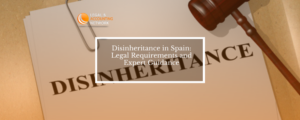Cross-border inheritance in Spain requires careful consideration due to its international nature. Understanding the applicable laws and dealing with multiple jurisdictions are key factors to address. Resolving disputes and managing double taxation can pose challenges, while ensuring fair distribution of assets to family members abroad is crucial. Digital assets and accounts also present unique considerations. Seek professional advice and proper documentation to navigate the complexities of cross-border inheritance planning.
Understanding Cross-Border Inheritance in Spain
When it comes to cross-border inheritance in Spain, it is essential to have a clear understanding of the legal framework and processes involved. In this section, we will explore the key aspects of cross-border inheritance within the Spanish context.
In Spain, receiving an inheritance entails signing a public deed before a Spanish notary. This requirement is due to the existence of inheritance taxes in the country, known as the “impuesto de sucesiones.” With the increasing globalization, cross-border inheritances have become more prevalent as many individuals hold assets in multiple European Union (EU) countries or have had regular residency in different EU countries.
Determining the applicable legal framework for a cross-border inheritance is crucial. Depending on the date of death, the law of either the deceased’s nationality or their last habitual residence country applies, unless specified otherwise in a will. It’s important to note that generic civil law in Spain does not uniformly apply across all autonomous regions, as some regions have their own regional legislation concerning inheritances.
In Spain, the order of succession is as follows: if the deceased has no valid will, children inherit from their parents, followed by the parents if there are no surviving children, then the spouse if there are no children or parents, and so on, until the inheritance passes to the state if no one else accepts it.
In the case of a testate inheritance, there are statutory heirs who cannot be excluded without a legitimate reason for disinheritance. These heirs include children and descendants, parents and ancestors, and spouses. The legitimate portion of the inheritance, which cannot be freely disposed of by the testator, constitutes two-thirds, while the testator can freely dispose of one-third of the total inheritance. If the testator leaves the entire inheritance to someone who is not in the order of succession, legitimate heirs can claim their portion.
Considering taxes, if an individual inherits property in Spain but has never resided there, they are still liable to pay inheritance tax corresponding to the Spanish property. However, if the individual’s habitual residence is in Spain and there are no assets located there, they may still be subject to taxes in Spain.
It is crucial to note that this section provides a foundational understanding of cross-border inheritance in Spain and should not be considered exhaustive. Further assistance should be sought to address specific questions or circumstances related to cross-border inheritance.
Factors to Consider in International Succession
When it comes to cross-border inheritance, there are several important factors that individuals need to consider in the context of international succession in Spain. These factors include determining the applicable law, dealing with multiple jurisdictions, and understanding the complexities of cross-border intellectual property rights.
Determining the Applicable Law
One of the key challenges in cross-border inheritance is determining the applicable law. Depending on the circumstances, the law of the deceased’s nationality or the last country of habitual residence may be applicable. This determination plays a crucial role in establishing the legal framework for the inheritance process.
Dealing with Multiple Jurisdictions
International succession often involves navigating multiple jurisdictions, which can add complexity to the process. Each jurisdiction may have its own laws and regulations regarding inheritance, taxation, and distribution of assets. It is important to seek legal counsel with cross-border expertise to ensure compliance with all relevant laws and to effectively manage the succession across different countries.
Cross-Border Intellectual Property Rights
In today’s digital age, intellectual property rights can present unique challenges in cross-border inheritance. Individuals may own digital assets, such as copyrights, trademarks, or patents, that have international implications. Understanding how these intellectual property rights are treated in different jurisdictions is essential to adequately protect and transfer these assets to the rightful heirs.
In conclusion, factors to consider in international succession in Spain include determining the applicable law, dealing with multiple jurisdictions, and understanding the intricacies of cross-border intellectual property rights. Navigating these aspects requires expert guidance to ensure a smooth and compliant inheritance process in the cross-border context.
Resolving Disputes in Cross-Border Inheritance Cases
Resolving disputes in cross-border inheritance cases can be a complex and challenging process. This section examines the mechanisms available within the European Union (EU) to address such disputes and the challenges individuals may face while seeking legal recourse.
Dispute Resolution Mechanisms in the European Union
The European Union has established various mechanisms to facilitate the resolution of cross-border inheritance disputes. One important legal instrument is the European Certificate of Succession, which helps simplify the recognition and enforcement of inheritance decisions across EU member states.
Additionally, the EU Succession Regulation (also known as Brussels IV) provides rules for determining the applicable law in cross-border inheritance cases within the EU. It aims to harmonize conflict-of-law rules and ensure a smoother resolution process for such disputes.
Challenges and Legal Recourse
Despite the existence of these mechanisms, individuals may still encounter challenges when resolving cross-border inheritance disputes. Differences in legal systems, interpretation of laws, and language barriers can complicate the process.
When facing such challenges, seeking legal advice from professionals experienced in cross-border inheritance law is crucial. These experts can help navigate the complexities of the legal systems involved, provide guidance on available legal recourses, and represent individuals in court if necessary.
It is important to note that the resolution of cross-border inheritance disputes can be time-consuming and costly. Parties involved should carefully consider alternative dispute resolution methods, such as mediation or arbitration, to potentially achieve a faster and more cost-effective resolution.
In conclusion, resolving disputes in cross-border inheritance cases requires an understanding of the mechanisms available within the EU and the challenges individuals may face. Seeking professional guidance and considering alternative dispute resolution methods can significantly contribute to a smoother resolution process.
Managing Double Taxation in Cross-Border Inheritance
Tax Implications for International Succession
When dealing with cross-border inheritance in Spain, it is crucial to understand the tax implications that may arise. Inheritances involving multiple jurisdictions can lead to potential double taxation, where the same assets are subject to taxes in both the home country of the deceased and the country where the assets are located.
In Spain, the tax implications for international succession are primarily governed by the Spanish Inheritance and Gift Tax (ISD). This tax applies to both residents and non-residents who inherit assets located in Spain. However, non-residents may be subject to different tax rates and exemptions compared to residents.
It is important to familiarize yourself with the specific tax laws and regulations in Spain as they can vary depending on factors such as the relationship between the deceased and the beneficiaries, the value of the inheritance, and the location of the assets.
Cross-Border Inheritance Tax Planning
To mitigate the impact of double taxation and effectively manage cross-border inheritance, careful tax planning is essential. Here are some key considerations to keep in mind:
- Seek Expert Advice: Consulting with a professional who specializes in international tax law and cross-border inheritance can provide valuable guidance. They can help identify applicable tax treaties, exemptions, and provide strategies to minimize tax liabilities.
- Consideration of Domicile and Residency: Understanding the residency and domicile rules of both the deceased and the beneficiaries is crucial. These factors can determine the tax jurisdiction and potential tax reliefs available.
- Utilize Exemptions and Deductions: Spain offers certain exemptions and deductions in the ISD, such as family allowances, which can reduce the taxable amount. Exploring these options can help optimize the inheritance tax planning.
- Coordinate with Multiple Tax Authorities: In cases involving multiple jurisdictions, effective coordination and communication between the tax authorities of different countries are essential. This ensures proper reporting, allocation of tax liabilities, and avoidance of double taxation.
By understanding the tax implications and implementing effective tax planning strategies, individuals can navigate the complexities of cross-border inheritance in Spain while minimizing potential tax burdens.
Ensuring Fair Distribution of Assets to Family Members Abroad
When it comes to cross-border inheritance in Spain, it is crucial to ensure fair distribution of assets to family members residing in different countries. To achieve this, it is important to understand their rights and entitlements as well as navigate the legal systems and inheritance laws in place.
Rights and Entitlements of Family Members
Family members, regardless of their location, have legal rights and entitlements to a fair share of the inherited assets. These rights may vary depending on the relationship with the deceased, such as being a spouse, child, or parent.
Some important considerations include:
- Spousal Rights: The surviving spouse is generally entitled to a portion of the inheritance, often referred to as the “legitimate portion,” which cannot be excluded without legitimate cause for disinheritance.
- Children’s Rights: Inheritance laws typically prioritize children as heirs, granting them a significant share of the assets. This ensures that children receive their rightful portion even in cases where a deceased parent has remarried or has assets in different countries.
- Parental Rights: In the absence of children or a surviving spouse, parents of the deceased may be entitled to inherit assets. However, the specific entitlements can vary depending on the circumstances and applicable laws.
Navigating Legal Systems and Inheritance Laws
Dealing with international succession involves navigating through different legal systems and inheritance laws, which can be complex and vary from country to country. It is crucial to understand the specific regulations and requirements in the relevant jurisdictions.
Important considerations in this regard include:
- Jurisdictional Issues: Determining the appropriate jurisdiction and understanding which laws apply can significantly impact the distribution of assets. Factors such as the deceased’s nationality, last habitual residence, and specific provisions in a valid will can influence which laws govern the inheritance process.
- Legal Counsel: Seeking professional legal assistance from experts experienced in cross-border inheritance matters is highly recommended. They can provide invaluable guidance on navigating the legal systems and ensuring fair distribution according to the applicable laws.
- Inheritance Formalities: Each country may have specific requirements to complete the inheritance process. These can range from obtaining official certifications and documentation to adhering to specific timelines and procedures. Complying with these formalities is essential to protect the rights and entitlements of family members.
By thoroughly understanding the rights and entitlements of family members and navigating the legal systems and inheritance laws effectively, it is possible to ensure fair distribution of assets to family members abroad in cross-border inheritance cases.
Digital Services and Challenges in Cross-Border Inheritance
In today’s digital age, digital assets and accounts present unique challenges in cross-border inheritance cases. It is important to consider the following factors when dealing with digital inheritance:
Considerations for Digital Assets and Accounts
1. Identification and Inventory: Begin by identifying all digital assets and accounts associated with the deceased, including social media profiles, email accounts, online banking, cryptocurrency wallets, and domain names. Create an inventory detailing the nature and value of each asset.
2. Access and Passwords: Accessing and managing digital assets often requires passwords and authentication. It is crucial to create a record of passwords or utilize a password management service to ensure authorized access to these digital assets.
3. Terms of Service Agreements: Familiarize yourself with the terms of service agreements of various digital platforms. Some platforms may have specific provisions regarding the transfer or management of accounts upon the death of the account holder.
4. Data Protection and Privacy: Respect data protection and privacy regulations when accessing and handling digital assets. Ensure compliance with applicable laws and regulations, especially in cross-border situations.
Protecting and Transferring Digital Inheritance
1. Digital Estate Planning: Include provisions for digital inheritance in your estate planning documents, such as wills or trusts. Specify the intended beneficiaries of digital assets and provide instructions on their management or transfer.
2. Nominate a Digital Executor: Appoint a digital executor or provide clear instructions to the executor of your traditional estate regarding the management and distribution of your digital assets. This individual should have the technical knowledge to handle digital accounts responsibly.
3. Legal Considerations: Understand the legal implications surrounding digital inheritance in different jurisdictions. Laws may vary regarding the transfer of digital assets, and it is important to work with legal professionals familiar with cross-border inheritance laws.
4. Digital Asset Protection Services: Explore specialized digital asset protection services that facilitate the secure storage and transfer of digital assets. These services can assist in the management and distribution of digital inheritance while ensuring data privacy and security.
Remember, the dynamic nature of digital services and technology necessitates staying updated with legal and technological advancements related to cross-border inheritance. Seeking professional advice and assistance is essential to navigate the complexities of digital inheritance in a cross-border context.
Practical Tips for Cross-Border Inheritance Planning
When it comes to cross-border inheritance planning, there are several practical tips to keep in mind. These tips can help ensure a smoother process and minimize potential complications for both the testator and the beneficiaries. This section will cover two important aspects to consider: seeking professional advice and documentation and estate planning.
Seeking Professional Advice
- Engage the services of a qualified international inheritance lawyer or legal expert who is well-versed in cross-border matters. They can provide invaluable guidance throughout the complex inheritance process.
- The professional should have a comprehensive understanding of both the Spanish inheritance laws and the laws of the relevant countries involved. Their expertise will help navigate potential conflicts and ensure compliance with all legal requirements.
- Seek advice early on, even before making any major decisions or drafting a will. Planning ahead and understanding the implications of cross-border inheritance can save time, money, and potential disputes down the line.
- Communicate openly with the professional, providing them with all necessary information about your assets, beneficiaries, and any specific concerns or preferences you may have. This will allow them to offer tailored advice and solutions based on your unique circumstances.
Documentation and Estate Planning
Documentation:
- Compile a comprehensive and up-to-date inventory of all your assets and liabilities, both in Spain and abroad. Include properties, bank accounts, investments, insurance policies, and any other significant holdings.
- Keep important documents organized and easily accessible. This includes your passport, identification cards, property deeds, wills, and any other relevant paperwork. Storing digital copies in a secure cloud-based platform can provide an extra layer of protection.
- Ensure that your will is valid and up-to-date, reflecting your wishes for the distribution of your assets after your passing. Consider involving a notary public or other relevant authorities in the drafting and authentication of your will.
Estate Planning:
- Consider the tax implications of your cross-border inheritance and explore strategic estate planning options. This may include establishing trusts, setting up holding companies, or incorporating other legal entities to optimize tax efficiency.
- Regularly review and update your estate plan to accommodate any changes in your personal circumstances, such as marriages, births, divorces, or the acquisition of new assets.
- Discuss your estate plan with your family members and beneficiaries, ensuring they are aware of your intentions and the rationale behind your decisions. This can help minimize potential disputes or misunderstanding.
By seeking professional advice and diligently managing your documentation and estate planning, you can navigate the complexities of cross-border inheritance more effectively. Keep in mind that the specific requirements and considerations may vary depending on your unique situation and the jurisdictions involved.







